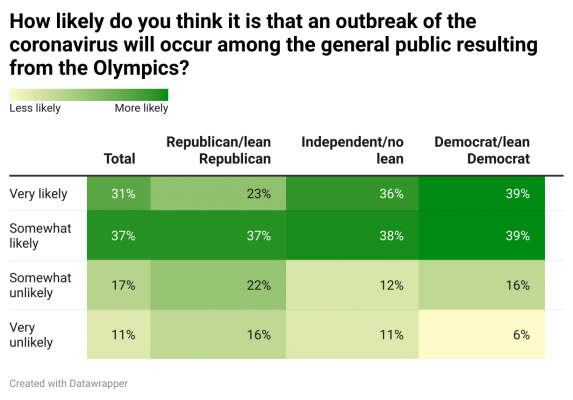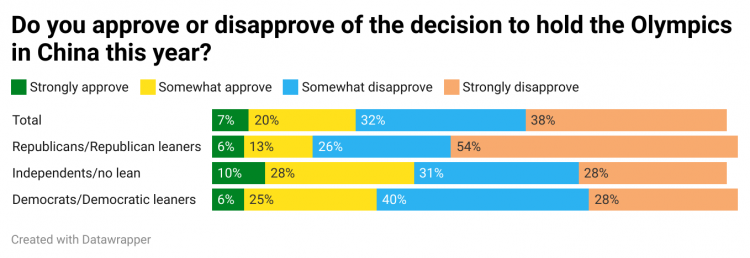Key findings:
- No love for the upcoming Olympics, at least not now: more Americans want to see the Games postponed (34%) or canceled entirely (16%) than say the Olympics should continue as scheduled (47%)
- 7 in 10 (70%) disapprove of allowing China to host the Games given its human rights record and history of limiting free speech
- A large majority of adults approve of the U.S. diplomatic, even as most also doubt the boycott will encourage China to reconsider its approach to human rights
- About one in four plan to root against athletes from China (25%), Russia (25%), and Iran (23%)
- Excitement diminishes: only 7% are more enthusiastic about this year’s Games than previous winter Olympics (Seoul 2018).
The show must go on
Amid an ongoing pandemic, just under half (47%) of adults say the Olympics should continue as scheduled, according to a new Axios|SurveyMonkey poll. About a third (34%) say the Games should be postponed and 16% say they should be canceled entirely.
- Almost 6 in 10 (58%) Republicans and Republican leaners say the Olympics should continue as scheduled compared with 45% of independents and 39% of Democrats/Democratic leaners
- Women are more likely than men to say the Olympics should be postponed (41% vs 27%)
- For comparison, in our July 2021 poll, 83% felt postponing the 2020 Tokyo Olympics was the right decision, while 14% said it was the wrong decision.
About 7 in 10 (68%) say a COVID-19 outbreak is likely to occur among the general public resulting from the Olympics. Last July, 59% said the same. This year, 28% say an outbreak is unlikely.
- 78% of Democrats and Democratic leaners, 74% of independents, and 60% of Republicans and GOP leaners say an outbreak is likely to occur
- 74% of women say it’s likely an outbreak will occur among the general public compared with 62% of men

China’s history leads to concerns
As the 2022 Winter Olympics are set to begin, many aren’t keen on China carrying the torch. Seven in 10 (70%) adults in the U.S disapprove of allowing China to host the Games given its human rights record and history of limiting free speech. Disapproval is especially high among Republicans: 8 in 10 (80%) disapprove of hosting the Games in China compared with 67% of Democrats and 60% of independents.

Disapproval comes as many raise concerns over China’s host status:
- Half (52%) are concerned about China’s human rights record
- 46% are concerned about a COVID outbreak
- 41% are concerned about the surveillance of participants
- A third (33%) are concerned this year’s Olympics will boost China’s international status
Over half (57%) believe China’s health and location monitoring app will be used for surveillance rather than controlling the spread of COVID-19. Just 38% believe the app will be used to help control the spread of the virus.
- 56% of Democrats and Democratic leaners, 22% of Republicans and Republican leaners, and 39% of independents say the app will be used to help control the spread of COVID-19
- Young adults are less skeptical: 44% of those ages 18-34 say the app will be used to help control the spread of COVID-19 compared with 36% of those 35-64 and 36% of adults 65+
- Whites are less trusting: just 35% say it will be used to help control the spread of COVID-19 vs. 44% of Hispanics and 52% of Blacks
Amid these concerns, the overwhelming majority (73%) in the U.S.support the government’s diplomatic boycott of the Games, including 40% who “strongly support” the boycott.
- Support is highest among older adults: 85% of those 65+ support the boycott compared with 72% of those 35-64 and 64% of those 18-34
- 81% of Democrats support the diplomatic boycott vs. 74% Republicans and 61% of independents
Many doubt the value of diplomatic efforts
Despite the support, most adults feel the diplomatic boycott may be all for show: 74% say the U.S.’s boycott will make no difference in China’s approach to human rights.
- 81% of Republicans and Republican leaners, 71% of independents and 71% of Democrats and Democratic leaners say the boycott will make no difference
- Younger people are the most optimistic: 17% of those 18-34 say the boycott *is* more likely to make China reconsider its approach to human rights, compared with 11% of those 35-64, and 4% of those 65+
Americans least likely to root for Russian, Chinese and Iranian athletes
Eight in 10 (82%) adults will root for athletes from the U.S., unchanged from July 2021 (82%), significantly higher than for any other country. Just 2% plan to root against the U.S., consistent with July 2021. This year, adults are very slightly more likely to root against athletes from China, Russia, and Iran.
Excitement for the Olympics diminishes
Just 7% of people say they are more enthusiastic about this year’s Games when compared to the previous winter Olympics Games, held in South Korea in 2018. Just under half (47%) say they’re less enthusiastic for this year’s winter Games. About 4 in 10 (42%) are just as enthusiastic.
- Among those who plan to watch, just 1 in 10 (11%) say they’re more excited for the Olympics this year.
- In July 2021, just over a third (33%) of adults said they were less enthusiastic about the Tokyo Games compared to the 2016 Games in Brazil.
While about half (49%) of adults plan on watching the Olympics, six in 10 (61%) are unable to name one athlete that’s competing this year. For comparison, last July 61% planned on watching the summer Olympics and only 44% were unfamiliar with any athletes.
Despite decreased excitement, just over half (53%) of adults who are planning to watch the Olympics say they’ll watch ‘some’ of this year’s Olympics, with just 17% watching ‘a lot’. Of those planning to watch, 63% say they’re still likely to watch an event even if they already know the outcome.
Read more about our polling methodology here.
Click through all the results in the interactive toplines below:



